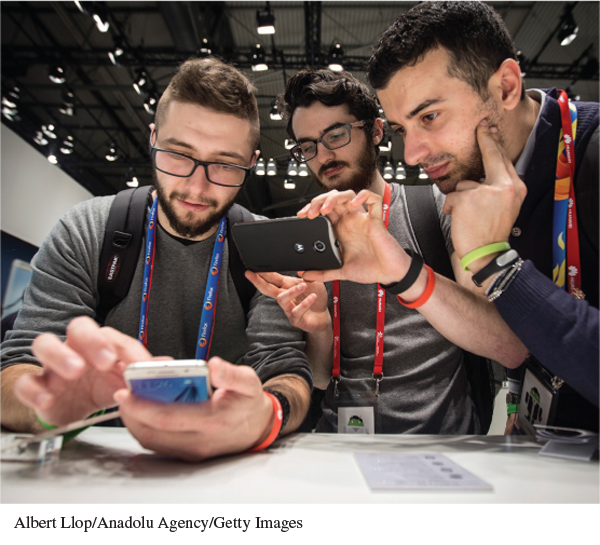A History of Western Society: Printed Page 1034
A History of Western Society, Value Edition: Printed Page 996
A History of Western Society, Concise Edition: Printed Page 1039
Life in the Digital Age
The growing sophistication of information technologies — a hallmark of the globalizing age — has had a profound and rapidly evolving effect on patterns of communications, commerce, and politics. As tiny digital microchips replaced bulky transistors and the Internet grew in scope and popularity, more and more people organized their everyday lives around the use of ever-
Leisure-
Digitalization transformed familiar forms of communication in a few short decades. Many of these changes centered on the Internet, which began its rapid expansion around the globe in the late 1980s. In the first decade of the twenty-
Entire industries were dramatically changed by the emergence of the Internet. With faster speeds and better online security came online shopping. People increasingly relied on the Internet to purchase goods from clothes to computers to groceries. Online file sharing of books and popular music transformed the publishing and music industries, while massive online retailers such as Amazon and eBay, which sell millions of goods across the globe without physical storefronts, transformed familiar retail systems.
The rapid growth of the Internet and social media raised complex questions related to personal privacy and politics. Governments and businesses used online tracking systems to amass an extraordinary amount of information on individuals and then monitor their political activities or target them with advertising. Privacy advocates worked with government regulators to shape laws that might preserve key elements of online privacy, and in general, rules were more stringent in Europe than in the United States.

The vast amount of information circulating on the Internet could also lead to the exposure of government and business secrets. The numerous materials posted online by the nonprofit organization WikiLeaks, dedicated to the publication of secret information and news leaks, documented numerous examples of government and corporate misconduct. The classified U.S. National Security Agency information leaked in 2013 by former CIA contractor Edward Snowden embarrassed U.S. diplomats and fueled further debates about Internet surveillance, national security, and privacy protection. (See “Individuals in Society: Edward Snowden.”) In addition, individuals could use smartphones and social media sites to organize protest campaigns. Facebook and Twitter, for example, helped mobilize demonstrators in Egypt during the Arab Spring (see “Turmoil in the Muslim World”) and allowed members of the Occupy movement to share news and shape strategy. A number of authoritarian states from North Korea to Iran to Cuba, recognizing the disruptive powers of the Internet, strictly limited online access.